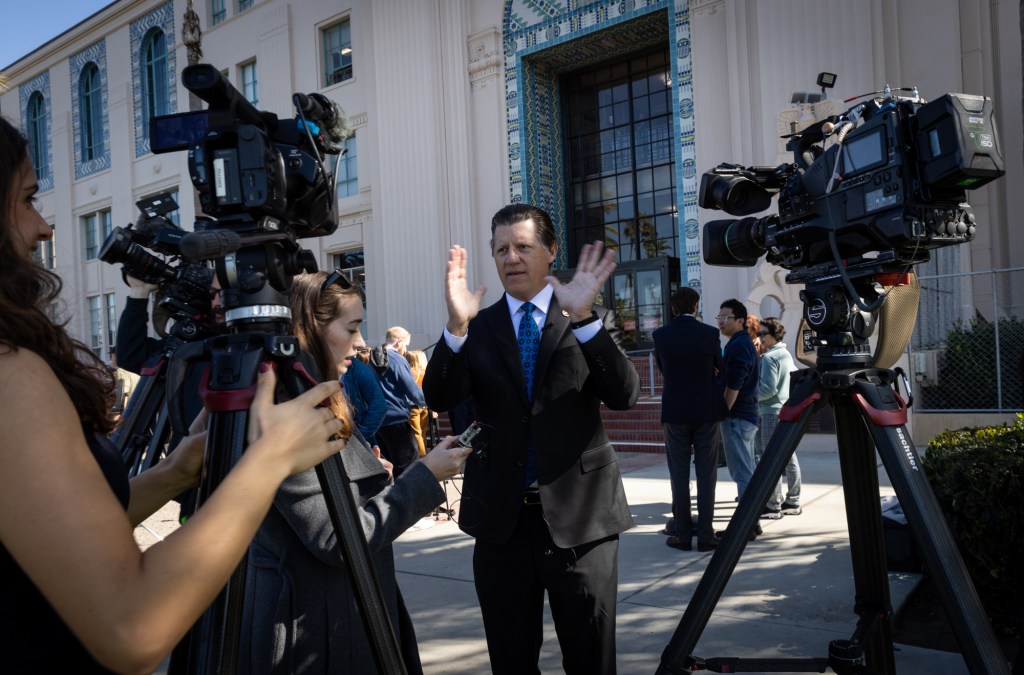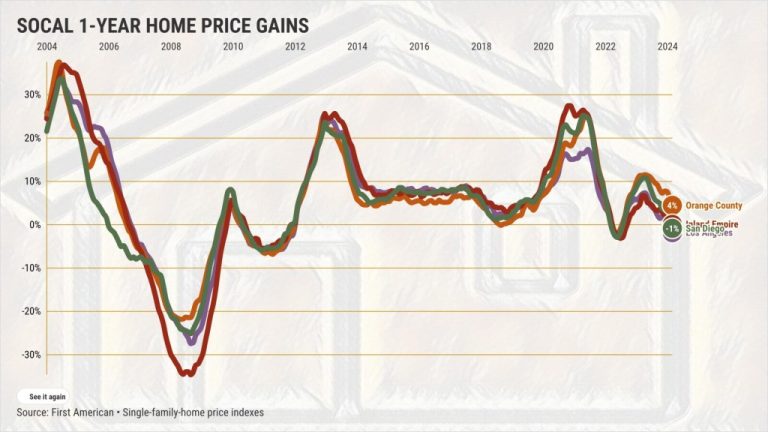
California Senate Minority Leader Brian Jones (R-San Diego) introduced a bill Thursday that would make it harder for local law enforcement in California to resist cooperating with immigration authorities.
On Friday, Jones was in downtown San Diego promoting his proposed changes to the state’s so-called sanctuary law as a group of nearby demonstrators loudly voiced their opposition.
The California Values Act currently limits cooperation between local law enforcement and immigration authorities, but makes exceptions in cases of people convicted of certain felonies.
SB 554, titled the Safety Before Criminal Sanctuary Act, seeks to mandate cooperation for those felonies, rather than giving local law enforcement discretion.
The bill would also prohibit local jurisdictions from passing their own ordinances to impose additional prohibitions beyond those set forth in such state law.

(Ana Ramirez / The San Diego Union-Tribune)
Pedro Rios, director of the American Friends Service Committee, speaks during a rally against a bill to overhaul California’s sanctuary state law.
The measure comes after the San Diego County Board of Supervisors voted in December to restrict the use of county resources to aid immigration enforcement.
“Our bill is a direct response to this radical unconscionable policy and was born out of concerns from the immigrant communities in my district,” Jones said at a news conference Friday outside the county administration building.
Jones was joined by other elected officials, including El Cajon Mayor Bill Wells, San Diego County Supervisor Joel Anderson, Vista Mayor John Franklin, San Marcos City Councilman Ed Musgrove and California Sen. Rosilicie Ochoa Bogh (R-Yucaipa), as well as Riverside County Sheriff Chad Bianco.
Jones insisted that the bill “is about protecting the public and aligning California with federal immigration enforcement for the worst offenders.”
Some steps away, a row of sheriff’s officers prevented demonstrators from approaching the area where the senator, and other officials and community members, were speaking. But that didn’t prevent the group from chanting in support of immigrants.
The group had gathered an hour earlier for a separate press conference opposing the bill.
“The so-called war against criminals is a pretext to attack our community that works here, that sweat for this country, that has given their lives fighting wars,” said Arcela Nuñez, from the North County community organization Universidad Popular. “We are here because we belong, this is our community, this is our country.”
The California Values Act was signed into law by then-Gov. Jerry Brown in 2017. It restricts cooperation with immigration officials, including notifying the federal government of inmate release dates and transferring individuals to Immigration and Customs Enforcement unless they have been convicted of certain crimes.
That bill aimed, among other things, to strengthen the trust of immigrant communities so they would feel safe to report crimes.
“SB 54 was then substantiated and held up by the Ninth Circuit Court of Appeals,” said Pedro Ríos, director of the American Friends Service Committee’s U.S./Mexico Border Program. “That is the law.”
Late last year the county Board of Supervisors passed a policy to prohibit deputies from assisting ICE, including transferring immigrant detainees, unless a federal warrant is issued. But county Sheriff Kelly Martinez said at the time she wouldn’t comply and would continue to follow state law.
The measure passed with the three votes of the Democratic supervisors, with Republican Jim Desmond casting the lone dissenting vote and Joel Anderson absent.
On Friday, Anderson expressed support for Jones’ bill, calling it “a positive step in the right direction.”
Former Supervisor Nora Vargas, who introduced the policy and later stepped down from her post, said in December after the vote that “we will not allow our local resources to be used for actions that separate families, harm community trust or divert critical local resources away from addressing our most pressing challenges.”
The vote came weeks before the start of the second term of President Donald Trump, who pledged to carry out mass deportations.
Jones’ office said in a press release that the bill is currently pending assignment to a Senate policy committee for a hearing.





